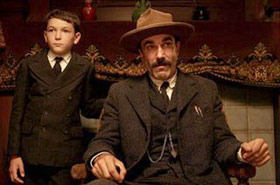
| HOME |
| NERVE |
| REVIEWS |
| ARCHIVE |
| EVENTS |
| LINKS |
| ABOUT US |
| CONTRIBUTORS |
| BACK ISSUES |
| CONTACT US |
 There
Will Be Blood (15)
There
Will Be Blood (15)
Written and directed by Paul Thomas Anderson
Based on 'Oil!' by Upton Sinclair
Screening at FACT from 15th February
2008
Reviewed by Adam Ford
Paul Thomas Anderson's adaptation of Upton Sinclair's 1920s novel 'Oil!' has received almost uncritical critical attention, and has been nominated for eight Oscars. There are undoubtedly many strongpoints, but also some significant weaknesses, most of which come from Anderson's gutting of his barely recognisable source material.
Daniel Plainview (Daniel Day-Lewis) is an impossibly cartoonish nasty man, who sees "the worst in people" and builds-up pointless "hatreds", like it's some kind of hobby. So he becomes an oil baron, with the idea that he can get rich enough to eventually fully isolate himself from the rest of the world. He embarks on that journey into nothingness with his boy (Dillon Freasier), and paradoxically draws a vast multitude of people into his machinations.
The film certainly scores highly on atmospherics, from the moody soundtrack by Radiohead multi-instrumentalist Jonny Greenwood to the equally foreboding cinematography of Robert Elswit. Day-Lewis and Paul Dano - who plays his character's arch nemesis, the fire and brimstone preacher Eli Sunday - add to this, with their haunting performances in the lead roles. But all this is like the icing and cherries on top of a cake that doesn't exist.
There's no doubt we live in dark and threatening times, and pessimism is a very understandable reaction to that. Anderson's best known previous work, 1999's Magnolia, was a frank and often beautifully touching look at our fractured and decaying society. In Magnolia, people wanted to be 'good', they just couldn't find a way to do it, and felt trapped by their social circumstances. In There Will Be Blood, Anderson retreats into the lazy safety of damning humanity as some kind of disgusting evolutionary wrong turn, with no hope of saving itself.
Sinclair's 'Oil!' was a far richer work, with characters who were far better drawn, dialogue that made some kind of sense, and plots that had great social significance. A proper adaptation of that novel would inevitably have important things to say about modern society, in a world where the black gold has never been more important. Instead, Anderson apparently decided that "it would be horrible to make a political film or anything like that. Tell a nasty story and let the rest take care of itself.”
In the end, there is blood. People get up, leave, and mutter about how depressed they feel.